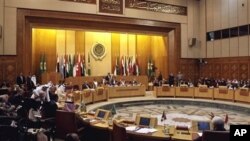Libya’s opposition reacted positively to Saturday’s vote by the Arab League supporting a no-fly zone in the country as fighting continued on the frontlines, with pro-Gadhafi forces said to be encroaching on the rebel stronghold of Bengazi.
The fighting on the frontlines continues west of the rebel headquarters in Benghazi as opposition leaders say they hope an international no-fly zone is coming sooner than later.
With regional support being one of the pre-conditions for a U.N. resolution on a no-fly zone, those opposition leaders, who have seen their situation on the front reverse in the last few days, now are hoping that international intervention could come in a matter of days.
Opposition spokesman Mustafa Gheriani says the effect could change the entire course of the revolution.
"I think the no-fly zone carries a lot of weight from a lot of different aspects," he said. "One, evens out the power, not quite even it out, but at least we got the troops that he does not have, he just has machinery. And we do not have to worry about anything coming from the air, and the other side is the psychological effect on Gadhafi's people, which is huge when they realize a superpower has been introduced to the game."
In eastern Libya, a sandstorm and heavy weather made it difficult for Gadhafi’s planes to fly. But Libya’s pro-government state television reported the pro-Gadhafi troops have captured the town of Brega. Opposition fighters deny that, and with the chaos of the desert fighting it is hard to confirm just where the frontline is.
But in Benghazi, the main rebel holdout, residents are preparing for the worst by stocking up on propane and other supplies should Gadhafi’s troops come their way and either attack or try to starve out the population here.
The anxiety from those pro-Gadhafi troops moving this way is definitely having an effect in the rebel-held east, with suspicion, fear and paranoia increasing. Reports of "fifth columnists" and infiltrators among the ranks of the opposition forces are also adding to that atmosphere.
On Saturday, gunmen on the road outside Benghazi shot dead 50-year-old cameraman Ali Hassan al-Jaber from Arabic network al Jazeera; making him the first journalist to be killed in this conflict. In a statement, al Jazeera said it believes its journalist team was targeted by pro-Gadhafi units working behind the lines.
Opposition leaders say they had captured the gunmen responsible. But their claim cannot be independently verified.
With government forces getting closer to Benghazi and suspicion about pro-Gadhafi elements working within their midst, the people in what is being referred to as "liberated Libya" say the support given by the Arab League is very welcome. They say they hope it will give a green light to the United Nations to authorize the no-fly zone so the rebels can start pushing back the encroaching pro-Gadhafi forces.
Some information for this report was provided by AP, AFP and Reuters.




